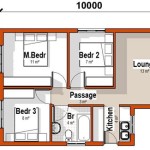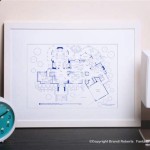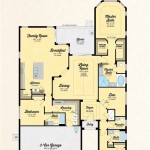The Floor Plan of Pierre Koenig's Stahl House
Pierre Koenig's Stahl House, officially known as Case Study House #22, is a renowned architectural masterpiece that embodies the principles of Modernist architecture. Designed in 1959, the Stahl House is a testament to Koenig's innovative approach to residential design, showcasing his mastery of open-plan living, cantilevered structures, and the integration of nature into the built environment. The house's iconic floor plan plays a pivotal role in its aesthetic appeal and functionality, making it a subject of fascination for architects, designers, and architecture enthusiasts alike.
Open-Plan Living and Fluid Circulation
The Stahl House's floor plan emphasizes open-plan living, creating a seamless flow between different living spaces. The central living area, which includes the dining room and kitchen, is defined by its open layout and expansive views. The absence of walls and partitions allows for natural light to permeate the entire space, fostering a sense of openness and connection with the surrounding landscape. The bedroom, located on a lower level, is accessed via a cantilevered staircase, adding a dramatic element to the design. The floor plan's open-plan concept fosters a sense of fluidity and allows for flexible use of space, adapting to the inhabitants’ changing needs.
Cantilevered Structures and Dynamic Views
One of the most distinctive features of the Stahl House is the use of cantilevered structures. The house's cantilevered deck, extending out over the hillside, provides breathtaking panoramic views of the Los Angeles basin. The cantilevered design creates a feeling of lightness and openness, blurring the boundary between the interior and exterior spaces. The cantilevered elements also play a crucial role in shaping the house's iconic profile, making it a recognizable landmark in the Los Angeles skyline. The floor plan, with its emphasis on cantilevered structures, maximizes the house's connection to its surroundings and offers a dynamic, ever-changing perspective.
Integration of Nature and Minimalist Aesthetics
Koenig's design philosophy for the Stahl House emphasizes the integration of nature into the living environment. The floor plan strategically positions windows and terraces to frame views of the surrounding canyons and valleys. The house's open-plan design and minimal furnishings further enhance the connection to nature, allowing the natural elements to become integral parts of the interior spaces. The minimalist aesthetics of the house, evident in its clean lines, simple materials, and lack of ornamentation, complement the natural beauty of the surrounding landscape. The floor plan's focus on bringing nature indoors creates a harmonious relationship between the built environment and the natural world.
Conclusion
The Stahl House's floor plan is a testament to Koenig's visionary approach to residential design. The open-plan layout, cantilevered structures, and thoughtful integration of nature create a living experience that is both functional and aesthetically captivating. The house's iconic floor plan continues to inspire contemporary architects and designers, showcasing the enduring power of modern architecture to create spaces that are both beautiful and functional.

Ad Classics Stahl House Pierre Koenig Archdaily

ハウス

Pierre Koenig Stahl House Los Angeles 1960 Case Study Houses

Stahl House Case Study Houses Floor Plans

Pierre Koenig Floor Plan Of Case Study House 22 Signed Photographic Print 1958 For At 1stdibs Stahl Plans Dimensions

Stahl House By Pierre Koenig 606ar Case Study Houses
Stahl House Case Study

Stahl House Marmit

Overdrive L A Constructs The Future 1940 1990 Getty Center Exhibitions

Ad Classics Stahl House Pierre Koenig Archdaily
Related Posts








